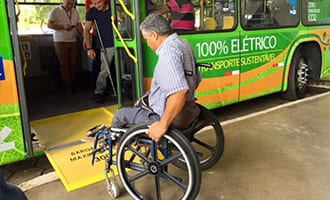Beyond the Wheelchair: Why Emotional Support Is Just As Important As Physical Help
When we talk about support for individuals using wheelchairs or facing mobility challenges, the immediate focus often gravitates towards physical assistance: getting around, transfers, accessibility modifications, and medical care.

When we talk about support for individuals using wheelchairs or facing mobility challenges, the immediate focus often gravitates towards physical assistance: getting around, transfers, accessibility modifications, and medical care. While these aspects are undeniably crucial, they represent only one part of the complex picture of well-being. True holistic support extends beyond the wheelchair, recognizing that emotional well-being is just as vital as physical help for a fulfilling and independent life.
The Invisible Burden: Emotional Challenges of Mobility Limitations
Living with a disability or facing age-related mobility decline can bring a unique set of emotional challenges:
Loss of Independence: The inability to move freely can lead to feelings of frustration, helplessness, and a sense of losing control over one's life.
Social Isolation and Loneliness: Physical barriers can make it difficult to participate in social activities, visit friends, or engage with the community, leading to isolation and loneliness.
Anxiety and Depression: Chronic pain, the unpredictability of health conditions, and the limitations imposed by mobility issues can contribute to anxiety and depression.
Impact on Self-Esteem: Changes in physical ability can affect one's self-image and confidence.
Caregiver Burnout: Family caregivers, while dedicated, can also experience immense emotional strain, which can indirectly affect the person they are caring for.
Stigma and Misunderstanding: Dealing with societal misconceptions or pity can be emotionally draining.
Why Emotional Support is Non-Negotiable for Holistic Wellness:
Addressing these emotional challenges is not a luxury; it's a necessity for overall wellness. When emotional needs are met:
Physical Recovery Improves: A positive mindset can significantly impact physical healing and adherence to therapy.
Enhanced Quality of Life: Emotional well-being fosters joy, purpose, and a sense of connection, making life more meaningful.
Greater Independence: Feeling emotionally supported can empower individuals to try new things and push their boundaries within their capabilities.
Stronger Relationships: Open communication about emotional needs strengthens bonds with family and friends.
Resilience: Building emotional resilience helps individuals cope better with ongoing challenges.
Practical Ways to Provide Emotional Support:
Active Listening and Validation: Truly listen to their feelings without judgment. Acknowledge their frustrations, fears, and triumphs. Let them know their emotions are valid.
Encourage Social Connection: Facilitate visits from friends and family. Help them join support groups, clubs, or community activities they enjoy.
Foster Independence and Choice: Empower them to make decisions about their daily life, no matter how small. Give them control wherever possible.
Celebrate Small Victories: Acknowledge and celebrate progress in physical therapy, successful outings, or even just a good day.
Promote Hobbies and Interests: Encourage engagement in activities they love, whether it's reading, gardening (adapted), art, music, or online communities.
Seek Professional Help: Don't shy away from recommending a therapist or counselor if depression, anxiety, or other mental health challenges become persistent.
Educate Yourself and Others: Learn about their condition and openly discuss their needs. Encourage others to do the same to foster understanding and empathy.
MobiCrew: The Companion That Connects and Cares
MobiCrew understands that support extends beyond just getting from one place to another. Our services are inherently designed to provide significant emotional benefits:
Combatting Isolation: Our trained companions offer genuine companionship, engaging in conversation, sharing stories, and providing a friendly face. This direct social interaction helps combat loneliness and fosters a sense of connection. [Find Your Companion: mobicrew.com/companion-care]
Empowering Independence and Dignity: By providing reliable, accessible transportation, MobiCrew enables individuals to attend social gatherings, pursue hobbies, run errands, and manage appointments independently. This freedom of movement is a huge boost to self-esteem and emotional well-being. [Book Your Accessible Ride: mobicrew.com/mobility-booking]
Reducing Stress for All: When reliable assistance is available for outings, it reduces stress not only for the person using the wheelchair but also for their family caregivers, freeing up emotional energy for meaningful interactions.
Facilitating Access to Emotional Support Services: We can transport individuals to therapy sessions, support group meetings, or visits with friends, ensuring they can access the resources and social connections vital for their emotional health.
Conclusion:
While physical assistance is foundational, true wellness for individuals with mobility challenges blossoms when emotional needs are prioritized and met. By providing empathetic listening, fostering independence, facilitating social connections, and offering services that go "beyond the wheelchair" like MobiCrew, we can collectively ensure that everyone lives a life rich in dignity, purpose, and emotional vitality.
Related
-

Wheels of Support
-

Beginners, chair cardio is the way to go!
-

Fashion Forward: Style Tips for People with Limited Mobility
-

Physiotherapy tips for home
-

How to Choose Reliable Mobility Services at Home in Mumbai
-

How Accessible Homes Create Truly Independent Living
-

Rolling Towards Peace
-

Focus your mind to stay healthy
-

Tips to Choose the Right Physical Therapist for Your Needs
-

Rollin' in the Greens.
-

Get in the game
-

Top Benefits of Visiting a Physical Therapy Clinic
-

Innovative Walking Assistance Devices for Adults
-

Embracing Holistic Wellness: A Guide for Seniors and Individuals with Mobility Needs
-

Finding the Perfect Health Service Provider: Tips for Elderly Care
-

Best Wheelchairs for Senior Citizens in Mumbai Buyers Guide
-

Benefits of Hiring a Companion for Elderly Care in Mumbai
-

The power of Pilates
-

Adaptive Fitness: Exercise Tips for Individuals with Limited Mobility
-

Choosing the Right Care Taker Services in Mumbai for Your Needs
-

Tips To Empower People with Limited Mobility
-

How to Choose the Right Sports Rehab Treatment Clinic Near You
-

Dating with a Disability: Navigating Love, Relationships, and Mobility Challenges
-

The Importance of Wheelchair Assistance for the Elderly
-

How Sport Rehabilitation in Mumbai Helps Athletes Bounce Back Stronger
-

Slippery Roads Ahead: How to Keep Elderly Loved Ones Safe This Monsoon
-

Rolling Through the Rain: A Monsoon Safety Guide for Wheelchair Users
-

Enhancing Sleep Quality for Wheelchair Users
-

The Ultimate Guide to Choose the Right Walking Devices for Adults
-

Best Elderly Care Apps for Seniors in 2025
-

The Role of Hydration in Health and Wellness
-

Top Qualities to Look for in Elderly Carers in Mumbai
-

Understanding Spina Bifida: Symptoms, Types, and Early Detection
-

Stay in shape with Yoga
-

Why Routine Health Check-Ups Matter for Wheelchair Users
-

How to Help People with Disabilities: A Guide to Inclusive Practices
-

Breathing right can change your life
-

Understanding the Benefits of In-Home Elder Care for Loved Ones
-

Sports Injury Prevention Strategies for Mumbais Active Youth
-

Best Physical Therapies in Mumbai for Post-Operative Recovery
-

In-Home Health Care Services in Mumbai Using the MobiCrew App









